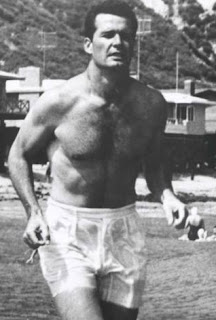
Another Cartoon Network show that gets it right, Regular Show (2010-) is about two young adult slackers, a blue jay named Mordecai (voiced by J.G. Quintel) and a raccoon named Rigby (William Salyers), who work as groundskeepers at a large city park, and share a room in the park office. The rest of the cast:
Benson, the short-fused park manager, a living gumball machine
Pops, an elderly man-child shaped like a giant lolipop.
Skips, an immortal Yeti.
Muscleman, an obese, green-skinned monster-person.
High-Five Ghost, a ghost with a hand protruding from his head.
Here are the voice artists at Comic Con.
Most episodes begin with some mundane chore or activity:
Benson assigns Mordecai and Rigby to get a scary movie for the park's movie night
Mordecai and Rigby accidentally burn the hot dogs for the park barbecue
Pop wants to become "one of the guys" by drinking a gallon of milk
But then spin out of control, into parallel worlds, into the past and the future, into the realm of Death or the Guardians of Eternal Youth.
What it gets right:
1. Mordecai has a crush on the coffee shop waitress Margaret, but Rigby is definitively, vocally not interested in girls. "Why do we have to hang out with girls? Why can't it be just guys?"
2. Rigby not only lacks heterosexual interests, he obviously likes guys. When he wishes that he could be with nothing but guys, a gang of motorcycle-riding unicorns show up. At first he enjoys their company, but they become rowdy, then destructive; finally, they sexually assault Benson (see, the slot where candy comes out...). So the unicorns have to go.
3. Mordecai is not immune to same-sex desire. When he loses a bet and is forced to dye his hair blond, he attracts a group of blond, beautiful people -- all male -- who encourage him to leave Rigby. Apocalyptic terror follows.
4. Pops displays no heterosexual interest, either, and has many feminine-coded gay-vague traits.
5. Muscleman has a girlfriend, but also a bromance with High-Five Ghost. When he is fired, High-Five Ghost quits with him.
6. No heterosexist "Every man's fantasy" rhetoric. "Guys' night" involves playing cards, watching movies, and eating pizza, not ogling babes.
Only one or two missteps:
1. When Mordecai accidentally sees Pops naked, he's severely traumatized. But maybe because Pops is elderly, so by definition "gross" to most 23-year olds, gay or not.
2. Muscleman's gyrating pecs attracts every women at a skating ring and infuriates all of the men.

































